Alex Higgins*
The people's grouch
He's always been the baddest of snooker's bad boys, he hasn't won a trophy for 18 years, he'll fly into a rage as soon as look at you, yet Alex Higgins still has claim to be the people's favourite. Why? Simon Hattenstone gets a close-up view of the dark side of the Hurricane
Saturday June 16, 2007
The Guardian
We're on the road with Alex "Hurricane" Higgins, legendary snooker player, troublemaker extraordinaire, human wreckage.
Or rather we're not. Higgins has made it known that he has no intention of coming out of his hotel room before 1pm. It's noon, and he's due to sign copies of his autobiography in Waterstone's, Edinburgh, in half an hour.
There is probably no sportsman who has had more stories told against him than Hurricane Higgins. George Best, Mike Tyson, Paul Gascoigne? Not even contenders. There's the time he headbutted the match official, or hit his girlfriend with a hairdryer, or threatened to kill fellow Northern Irish snooker player Dennis Taylor and have his daughter's boyfriend "crippled", or drank a half-pint of perfume poured for him by his soulmate Oliver Reed, or slept with a stranger the night before his wedding ...
And then, of course, there is the snooker. Higgins was and remains the People's Champion - despite not having won a trophy for 18 years and having not played in a ranking tournament since 1997, when he was ranked 156th in the world. Never has there been a man so aptly nicknamed. He played like a hurricane, his temper blew like a hurricane. But there was more to him than speed and recklessness - grace, emotion, brain power, style, instinct and the fearlessness that so easily spilled into nihilism. In his heyday in the 70s-80s, Higgins was rarely off the back or front pages. Everybody knew Hurricane Higgins. He was a staple for any self-respecting impressionist - fag in mouth, cue in hand, face twitching, nose snorting, lips sneering, dancing round the table like Fred Astaire on fast-forward.
Plenty of players have achieved more - Ray Reardon, Steve Davis, Stephen Hendry - but snooker fans have always loved the bad boys; the troubled geniuses who play through the long, dark nights of the soul. Down the years there have been only three - Higgins, Jimmy White and Ronnie O'Sullivan - and Higgins was by far the baddest of them all. Nobody was adored like the Hurricane and nobody despised like him. The writer Gordon Burn said Higgins "is probably more unwelcome at more hotels in every part of the globe than any other person in Britain". Bill Borrows, who wrote a fine biography after finding it impossible to work with Higgins on an official version of his life, said that the only people who like Higgins are those who haven't met him.
He won two world championships, and only five other major tournaments. He paid out almost as much in fines as he won in prize money, after insulting this player or bashing that official; he probably spent more than he won in the pub; and he definitely lost more than he won down the bookies. He has been married twice, had relationships with numerous blondes, lived with a "high-class escort girl" and has two grown-up children. In recent years he has been bankrupt and hollowed by cancer. He has returned to Belfast where he lives in a council flat, with only his Guinness, his roll-ups and his anger for company.
Helena, his publicist, who works for the publisher Headline, looks frayed. She says it's not going to be an easy day. Higgins has already told her he won't be talking to me. As we walk into the hotel, a ghost in a fedora glides past - stick-thin, drainpipe trousers, suede coat, cravat covering the scar on his throat. I do a double-take.
"Hello, Alex!" I say with delight.
Silence. He looks at me with contempt and sits down. Helena thanks him for joining us so promptly. "We're going to the signing, and we thought maybe Simon could join you for a drink afterwards."
He glares at her. "We thought! We thought! We thought fuckin' nothing." It was always hard to hear Higgins - he spoke like a man who had watched The Godfather too many times. Now, after the throat cancer, he's even harder to understand. "When I drink, I drink alone." He looks at the schedule, mutters "12-fucking-30" to himself, and flings it at Helena with surprising strength.
There is a small queue of devotees inside Waterstone's, but Higgins doesn't seem to see them. He pokes at Helena's face with his finger, grabs her by the arm and drags her away. It's horrific. I stare at the two of them, paralysed. He is spit-whispering words in her face. "You stupid, fucking cunt ..." I want to hit him. Sod the interview. But I don't - I just stare.
Helena frees herself. She is distraught, says she'll probably be left with a bruise, but does her best to retain her dignity. "I think it's best if I keep my distance. He's not in a good mood this morning."
What's going on in the Hurricane's head? Why such rage? Yes, we've read about it over the years, all the matches and relationships that ended in violence, but it's shocking to see it first-hand. Is it because he's lost so much? Because he's in so much pain? Or is the simple truth that Alex Higgins has spent a lifetime hitting out against anybody and everybody, because he knows no other way?
He sits down and starts signing books. His handwriting is beautiful and elaborate. He completes every signature with a smiley face. Ironic, because he never smiles himself. He used to smile when he had teeth. There was something irresistible about the young Higgins, despite the furies. Not least that smile - boyish, sexy, devilish, thoroughly Irish. Women loved him, until they got to know him better. Now, he seems so painfully aware of his diminished appearance. Today, he's put in false teeth, but they are uncomfortable, and they embarrass him.
His book makes for a depressing read. The love is beaten out of every relationship, the joy out of every victory. Every year ends up worse than the previous one. He weeps for his dead parents, the women come and go, and he blames his failings on other people. The only moving passage is when he explains that the reason he is writing the book is so he can buy a whole mouthful of tooth implants, as if that's all he needs to win back his youth and hope.
He signs the books, draws the smiley face and constantly checks his watch. On the dot of 1.30pm, he stops. The photographer has set up at the Cafe Royal round the corner. Higgins is not having any of it, though. He scuttles off.
This is getting ridiculous. There are six of us - me, the photographer, his assistant, Helena and Mark from Headline, and Norrie the driver searching Edinburgh's pubs for Higgins. No luck. At one point, I stand in the town centre, cup my hands around my mouth and scream as loud as I can, "Alex Higgins, where are you?" Nothing.
An hour or so later, Norrie, the only one Higgins is talking to, gets a call. Higgins has agreed to have his photograph taken. The photographer and his assistant run down the street with cameras and lights, and arrive breathless. "I've a beautiful set-up at the Cafe Royal," Martin says, hoping to sway him.
"Who drinks at the Cafe Royal?" Higgins scoffs.
Before meeting Higgins, I spoke to Ronnie O'Sullivan. As a boy, his hero was Steve Davis, because he kept on winning, but he adored Higgins for his derring-do. He says Higgins is cunning, incredibly intelligent and quite mad. "Whenever he came into a room, the atmosphere changed. There was something intimidating about him. You couldn't relax around Alex."
A few years ago, at a tournament in Belfast, Higgins told O'Sullivan that he should hire him as a coach. O'Sullivan made it clear he wasn't too keen. At 3am that night, he was woken up by a phone call. "I was sharing a room with my friend Mickey. Mickey answered, and said, 'Who is it?' 'Alex.' 'What d'you want? It's 3am.' 'I just want to speak to Ronnie.' 'He's asleep. It's 3am.' 'I just need three minutes.' 'What you want to do with him,' says Mickey, 'boil an egg? You can't speak to him, he's asleep.' 'No,' says Alex, 'I just want you to pass on a message to him from me.' 'OK.' 'Tell him to fuck off.'" O'Sullivan bellylaughed when he told me the story.
Alexander Gordon Higgins weighed in at just over 4lb when he was born in Protestant Belfast in 1949 - "A minute kid, but strong just the same." His father, also Alex, was an illiterate labourer, his mother, Elizabeth, worked as a cleaner, picked potatoes and ran the family. She was the boss, and Alex was her golden boy.
By the time he was 12, he was skipping school, spending time down the Jampot snooker club hustling grown men for money. His first love was horses and he hoped to be jockey. At 15, he went to work at Eddie Reavey's stables in Berkshire. The trouble was, Reavey's wife, Jocelyn, said, "Alex's ambition was to clean out the local bookmaker, not the stables." He ate too many Milky Bars and drank too much Guinness to make it as a jockey. By the time he left, he was 10 stone and heading for the snooker circuit. At 22, he won the world championship at his first attempt, beating John Spencer 37-31 in the final. Back then, matches lasted weeks, and the tournament lasted the whole year. It wasn't televised, and Higgins won £480.
We finally sit down together in the pub. I ask if I can put on my tape recorder. He takes off his hat. His baldness is shocking. So are the concave cheeks. His fingers are as long and elegant as ever. He lifts his head from the racing pages, and peers over his professorial glasses, "What's the point? I'm not going to say anything to you."
Jesus. I'm sitting with a Guinness, thoroughly fed up. I'm thinking back to my childhood - how unbelievably thrilling and sexy I thought Higgins was, how I wept when he brought on his wife and baby when he won the World Championship in 1982, how I wanted him to win even when he was in decline.
I get out my paper, try to forget about him, drink my pint. The more I ignore him, the more he opens up. It's impossible to interview Higgins. He explodes if you interrupt his stream of non sequiturs.
"There's so much shite on telly. Patrick Moore is the only decent thing. And some of the antiques programmes are OK," he says apropos of nothing.
I tell him my dad took me down to his club in Manchester when I was young.
AH: "I didn't have a club."
SH: "OK. Did you play at a club by the Rialto?"
AH: "Yes."
SH: "I loved it. It was a pisshole."
AH: "No, it wasn't a pisshole. I think you went to another club. Excuse me, Simon isn't it? If it had been a pisshole, I wouldn't have gone into it."
SH: "Is snooker corrupt today?"
AH: "The seeds of corruption were sown long ago. The game's dying. Do you agree the game is dying?"
SH: "There's only one person people want to watch."
AH: "Ronnie obviously."
He says he despised the people who ran the game, still does. He talks about the year he made his comeback in 1987, after serving a year's ban for headbutting that official, and the boxes in Blackpool were empty for everyone but him because they were so expensive. "I suggested they lowered the prices to about £1 entry. I said you've got all them cunts in the WPBSA [snooker's governing body] doing nothing, why don't you go along the seafront, around all those guest houses, sticking flyers up. They said it was too much hard work. If I hadn't been hustling and playing, I could have been up and down that fucking front and knocking out tickets and getting people in."
It's an effort for him to talk in full sentences. Every so often he spits or coughs into his handkerchief, clears his throat and starts again. Higgins has always been a hustler. Even when he was making serious money (he's estimated to have earned £3m from the game), you could find him in pubs taking on all comers. "I've always played for a few quid. Fivers, tenners, whatever. Just as you'd play a round of golf."
SH: "Do you miss playing?"
AH: "Yeah, you would have to, wouldn't you? Luckily, I'm not fit enough. All things being equal, fit and well, I'd still be in the top 32."
SH: "You look better than a couple of years ago."
AH: "I look an awful lot better, and give me six months, when this book is finished, I might come back. I'm thinking of teaching a few kids and playing a few decent players and entering some tournaments in Prestatyn. It wouldn't be any good entering any at the moment because my cue's not ready."
SH: "When was the last time you had a cue in your hand?"
AH: "About a month ago. I had a 100 break, too - 116... Go on, buy us a quick half before we go."
Higgins is moaning about how rubbish his book is, how the ghostwriter let him down, how the world let him down, when Ronnie O'Sullivan rings (I'd asked him to). I pass the phone to Higgins, who brightens up. "Hello, Ronnie, how are you. All right in your head? I look terrible. Anyway, why didn't you get me as a coach instead of Reardon? I know what you're doing wrong... I'm not going to tell you until you fucking give me a job. The thing is, I might enter the last round of qualifiers this season and I wouldn't mind going to a club for a month with a nice table and playing you, then I'll tell you other things that are wrong about your game... I was a bit wired at the time... Anyway, Ron, anyway, OK then."
I think Ronnie has just mentioned the time that Higgins rang him at 3am to tell him to fuck off.
What made him the people's champion?
AH: "I had a nice smile and I had teeth."
SH: "How's the cancer?"
AH: "I've still got to go for check-ups every six weeks."
My questions have become even more disjointed than his answers. He has that effect. I ask whether snooker drives players mad - all the darkness, airlessness, sitting, waiting, the crazy intensity. "Only in my case." He says most players are too boring to be crazy.
SH: "Did snooker make you as you are, or was it just your personality?"
AH: "I'm quite a studious person, I think. If I'd been from a different background, I could have gone to a grammar school, I suppose. I might have been a different person."
SH: "Were you always a fighter?"
AH: "What, fisticuffs? No, I was too small. Hence trying to be a jockey."
SH: "You're not that small?"
AH: "Simon, are you stupid or something? When I was 15, I was about seven stone - the average weight for a kid of 11 in them days was about nine stone. I managed to keep my head down because there was about half a dozen heavies in the class and there was bullying in them days. But I stayed one step ahead of them all the time."
SH: "How?"
AH: "I knew how to stay out of trouble."
SH: "How?"
AH: "I could placate the fuckin' various factions." What happened to Alex Higgins, the great placator?
It's time to head for a signing in Glasgow. Norrie, the driver, tells Higgins he can sit in the front where he can smoke, because there are no ashtrays in the back. Higgins, quite the gentleman, nabs an ashtray from a pub table and hands it to me. "There, for you. So you can smoke in the car."
We're driving to Glasgow. Higgins is devouring the newspapers in the front, chain-smoking and providing a running commentary on the day's news.
Former footballer Andy Gray has been mauled by the Sun for allegedly badgering women. "Did you read about Andy Gray? He's fuckin' disgraced himself. Front page. I met him years ago and I thought he was a lovely guy. I knew he was a ladies' man, but I didn't think he'd behave like that. It was the booze. You end up chatting up any old thing. I was always quite shy with females. I wouldn't do anything like that. Not now, not with the teeth."
Higgins keeps throwing me newspapers he's finished with or pulling out odd pages for me to look at. By now I am absolutely desperate for a pee and I can't bear the sound of his voice but he's promised me half an hour in Glasgow, a proper interview.
"Write this down, Simon. I'm pissed off I never received an MBE or OBE. My parents would have been so proud, and so would my public. Print that - say why didn't they give Alex an OBE? It was a disgrace. Nobody worked as hard to make snooker a popular sport as I did. And they give them to the cricketers - I wouldn't give that lot a ploughman's lunch. Pffssssh."
I rush into his hotel in Glasgow for the loo. By the time I emerge, Higgins has headed off to the pub. Next time I see him is that evening at a book signing in Borders. He's in a better mood. The shop asks him if there's anything he needs while he's signing. "I'll have a pint of Guinness in 10 minutes."
Lifelong Higgins disciples have come to pay homage. Helena is still keeping her distance and so am I. Many of the fights he got into as a player came about when referees encroached on his space - "Don't come within six foot of me," he used to say.
A man reminds him of the time he came from 7-0 down to beat Steve Davis 16-15. Higgins almost smiles. "I wish we'd played another 15 frames. I would have won 30."
Tommy Stevenson has a tattoo on his arm with the words Hurricane Higgins alongside the world championship trophy. "I saw him at the exhibition match with Steve Davis in 1981, and I had just had it done. I told him that's your world championship next year, Alex, and it was." A quarter of a century on, he's still spooked by his powers of prophecy.
Higgins signs a white snooker ball for a little boy with such tenderness. He blows on it to dry it and shows him where to grip it. "Hold it like that for 10 minutes and it will be all right." But all the time he's looking at his watch, making sure he doesn't do a second more than his contracted hour, even though he is selling his own book.
At 7.30pm exactly, he stops. When I look round, he's disappearing into a lift. I consider giving chase, but I haven't got the energy or will. Half an hour later, I phone him on his mobile. There is music playing, people chatting, I can almost smell the pub he's sat in. "I'm back at my hotel," Higgins says. "In my bedroom, having a rest."
"Do you fancy doing the interview you promised earlier?"
"No, we talked in the car."
"Not much, Alex."
"No, I'm tired. Look, just make it up. That's what most fucking journalists do anyway." The line goes dead.
• From The Eye Of The Hurricane: My Story, by Alex Higgins, is published by Headline at £18.99.
29. 4. Robert
Návštěvnost stránek
ANTEE s.r.o. - Tvorba webových stránek, Redakční systém IPO

![alex[3].jpg](image.php?nid=1380&oid=628434&width=260&height=195)
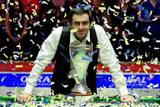
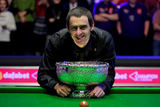
![Welsh Open[2].jpg](image.php?nid=1380&oid=3689245&width=160&height=174)
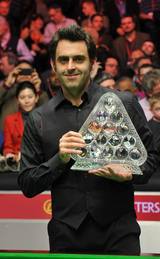

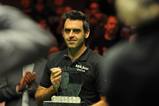
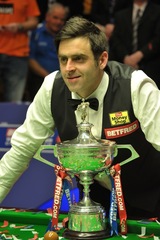
![Ronnie_OSullivan_Snooker_Champion_PTC7_2011[2].jpg](image.php?nid=1380&oid=2439625&width=160&height=151)
![topimage[2].jpg](image.php?nid=1380&oid=2498497&width=160&height=141)
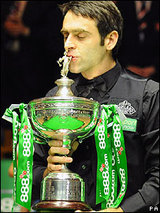
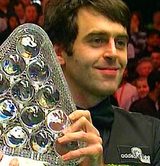
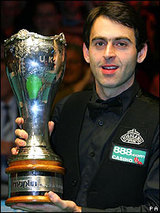

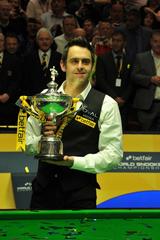

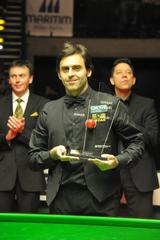
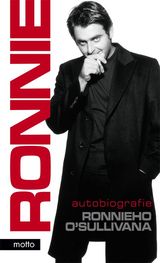
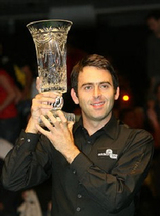
![08%20pls%20ronnie%20trophy[3].jpg](image.php?nid=1380&oid=1189442&width=160&height=198)
